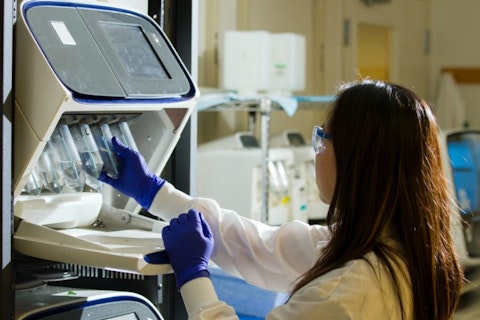Madison Funds, an investment management firm, published its “Madison Investors Fund” second-quarter 2021 investor letter – a copy of which can be downloaded here. A quarterly portfolio return of 6.82% was recorded by the fund’s Class Y shares for the second quarter of 2021, compared to the S&P 500 Index gains of 8.55% for the same period. You can view the fund’s top 5 holdings to have an idea about their top bets for 2021.
In the Q2 2021 investor letter of Madison Funds, the fund mentioned Becton, Dickinson and Company (NYSE: BDX) and discussed its stance on the firm. Becton, Dickinson and Company is a Franklin Lakes, New Jersey-based medical device company with a $71.4 billion market capitalization. BDX delivered a -0.62% return since the beginning of the year, while its 12-month returns are down by -3.96%. The stock closed at $248.31 per share on August 18, 2021.
Here is what Madison Funds has to say about Becton, Dickinson and Company in its Q2 2021 investor letter:
“Becton, Dickinson and Company (“BD”) is one of the world’s largest medical supply, devices, laboratory equipment, and diagnostic products manufacturers. We like BD because it is a leader in the medical and life science industries with a durable mid-single digit growth profile and attractive returns on capital. They generate about 85% of revenue from consumables and 15% from equipment, and each year, they manufacture billions of needles,
syringes, catheters, tubes, and medical devices which results in significant economies of scale that can be matched by few competitors. Their Life Sciences segment produces products that provide diversity in the steadily growing diagnostic testing and life sciences research fields.Regarding the short-term issues, it’s been a challenging past 18 months for the company. In February 2020, they announced the FDA required an updated 510(k) clearance for their Alaris infusion pump. As a result, BD had to suspend selling new pumps until the updated regulatory filing received FDA clearance. In addition to the regulatory headwind, BD’s business was negatively impacted by the COVID-19 pandemic as individuals postponed doctor office visits and hospitals deferred non-emergency medical procedures. We believe these postponements are just now normalizing. Lastly, while BD’s Life Sciences business swiftly brought COVID-19 tests to market, there is uncertainty over the magnitude and duration of these revenues.
We believe these negative dynamics will be resolved over time, and meanwhile, base business growth and managerial actions should move per share earnings power higher. First, BD’s management is confident that the Alaris infusion pump has maintained its market share over the last 18 months and many hospitals have even added to their fleet of pumps with BD shipping them under medical necessity provisions. The new 510(k) filing was submitted in April 2021 and is expected to receive approval sometime in the next year, which will fully alleviate the concern. Second, we believe that hospital utilization and diagnostic testing volumes will return towards normal levels as vaccination rates increase and global economies reopen (the U.S. is reportedly currently at 95% and 100% utilization for inpatient and outpatient volumes, respectively). While COVID testing revenues (about 10% of 2021 BD revenue) are expected to decline, management’s choice to accelerate the depreciation of those production assets and to spend a portion of the excess 2021 profits will dampen the earnings cyclicality. Base diagnostic testing revenue will otherwise recover with patient volumes, and combination flu-COVID tests will help maintain some COVID testing revenues into the future. Third, BD’s balance sheet has improved markedly over the past year, and we expect them to reinitiate share repurchases at a meaningful level. This will lead to the first material share count reductions since 2014.
At today’s share price, we deem this to be value-creative capital allocation. Fourth, BD recently announced its intention to spin off its slower-growing diabetes business in 2022; our observations in recent years suggest that separations such as this have been value-creative for health care investors. Fifth, this year’s earnings quality is high by dint of management underutilizing its production assets to lean out inventories and to accelerate its R&D programs,
both which positively impact future cash earnings power. Thus, while there is near-term uncertainty regarding the resolution of the issues mentioned, we think they’ll resolve. We believe that management’s actions and the resumption of base demand leave BD positioned to return to a good long-term growth profile.The stock trades at less than 19x Wall Street’s consensus earnings estimate for 2022, which is approximately 90% of the earnings multiple of the S&P 500 and an even steeper discount to BD’s medical technology peer group. We think the stock is attractively priced and a good value for a leader in the growing medical technology and life science industries.”

national-cancer-institute-GcrSgHDrniY-unsplash
Based on our calculations, Becton, Dickinson and Company (NYSE: BDX) was not able to clinch a spot in our list of the 30 Most Popular Stocks Among Hedge Funds. BDX was in 52 hedge fund portfolios at the end of the first half of 2021, compared to 65 funds in the previous quarter. Becton, Dickinson and Company (NYSE: BDX) delivered a 1.59% return in the past 3 months.
Hedge funds’ reputation as shrewd investors has been tarnished in the last decade as their hedged returns couldn’t keep up with the unhedged returns of the market indices. Our research has shown that hedge funds’ small-cap stock picks managed to beat the market by double digits annually between 1999 and 2016, but the margin of outperformance has been declining in recent years. Nevertheless, we were still able to identify in advance a select group of hedge fund holdings that outperformed the S&P 500 ETFs by 115 percentage points since March 2017 (see the details here). We were also able to identify in advance a select group of hedge fund holdings that underperformed the market by 10 percentage points annually between 2006 and 2017. Interestingly the margin of underperformance of these stocks has been increasing in recent years. Investors who are long the market and short these stocks would have returned more than 27% annually between 2015 and 2017. We have been tracking and sharing the list of these stocks since February 2017 in our quarterly newsletter.
At Insider Monkey, we scour multiple sources to uncover the next great investment idea. For example, lithium mining is one of the fastest growing industries right now, so we are checking out stock pitches like this emerging lithium stock. We go through lists like the 10 best EV stocks to pick the next Tesla that will deliver a 10x return. Even though we recommend positions in only a tiny fraction of the companies we analyze, we check out as many stocks as we can. We read hedge fund investor letters and listen to stock pitches at hedge fund conferences. You can subscribe to our free daily newsletter on our homepage.
Disclosure: None. This article is originally published at Insider Monkey.





